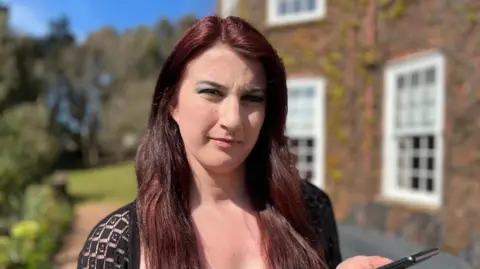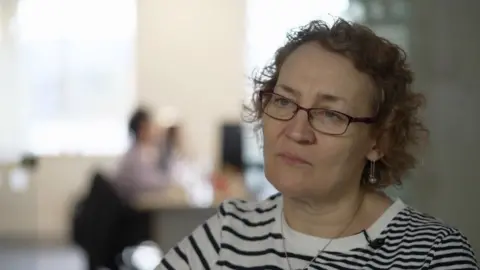Revenge porn victim 'constantly paranoid' after topless images shared online
 BBC
BBCA record number of victims of so-called revenge porn reported intimate image abuse to a dedicated UK helpline last year.
In 2024, the Revenge Porn Helpline, funded by the Home Office, recorded 22,227 new cases, a 20.9% increase from the previous year.
Non-consensual intimate image (NCII) abuse is illegal in the UK, and occurs when sexual photos or videos are produced, published or reproduced without consent, both online and offline.
The helpline manually reports non-consensual intimate images for removal on behalf of victims, by using reverse image searches, and contacting the platforms where the content was shared.
The service helped to remove 81,000 intimate images last year, but despite this, re-victimisation rose by 260%, with 61,213 previously reported images continuing to circulate online.
Helpline manager Sophie Mortimer said revenge porn was one of "the most significant and concerning digital harms affecting adults".
'The shame shouldn't be on me'
Jasmine, 28, says she never thought she would become a victim of revenge porn when she shared intimate topless images of herself with an ex-boyfriend.
"You only send photos to people you trust, I'd known him for years. I never would have suspected that he would do it," she said.
"A close friend at the time messaged me to say, 'hey, look, I've come across you on these websites', and that was the first I'd heard of it. I'm not sure how long it had been happening before then," she added.
Jasmine describes feeling "constant paranoia" ever since her intimate images were shared eight years ago.
"It's horrendous, to be honest, even to the point where if a man smiles at me on the street, I'm like: 'Are you polite? Or have you seen me on one of these websites?'"
"For years I didn't talk about it, but now I've started. The shame shouldn't be on me, it should be on him. I refuse to have that shame."
Jasmine says she reported the matter to the police and the individual was given a verbal warning.
Non-consensual intimate image abuse can appear in different forms, such as sextortion, voyeurism, synthetic sexual content - also known as deepfakes and threats to share.
In the 10 years since its launch, the helpline has removed a total of 387,000 intimate images.

Manager Sophie Mortimer says the numbers coming to the helpline are just the "tip of an enormous iceberg".
She believes the true number of those affected is much higher than the reported figures show.
"What we need is really robust and detailed data collection that is consistent across all our police forces and that is then tied up with prosecution outcomes."
"We're not seeing patterns from police data, or whether there are any regional variations or what different police forces are seeing, as well as what those outcomes are like."
"Prosecution rates remain painfully low and victims deserve better outcomes."
As of 31 January 2024, prosecutors no longer need to prove intent to cause distress when a person shares non-consensual intimate images.
But it is still legal to possess them.
The Women and Equalities Committee says the law needs to be strengthened to make possession of non-consensual intimate images illegal.
Frances Ridout, director of the Queen Mary Legal Advice Centre, says those convicted of sharing intimate images without consent are sometimes given their devices back.
She says deprivation orders, which would strip offenders of this right, are not used enough.
Official police data on revenge porn is hard to quantify because there is no national database.
Each police force records data independently and follows different procedures for data collection so it is hard to get a national picture. The information provided by the Revenge Porn Helpline helps show the scale of the problem.
A Ministry of Justice spokesperson said: “Women have the right to feel safe wherever they are, in both the online and offline world." Last year laws were strengthened to ensure platforms must take steps to proactively remove this material.
Jasmine says the images were removed after she reported them to the police but she regrets sharing intimate images.
"It's not worth the momentary fun versus stress for potentially the rest of your life," she says.
"Young girls need to be aware that those images can follow you for the rest of your life if they're in the wrong hands.
"And you will never know if it's the wrong hands until it's too late."
If you have been affected by issues raised in this story, help is available via the BBC Action Line
